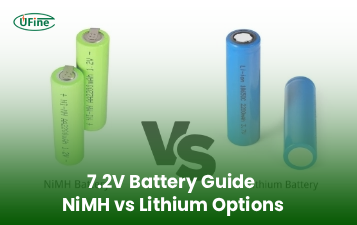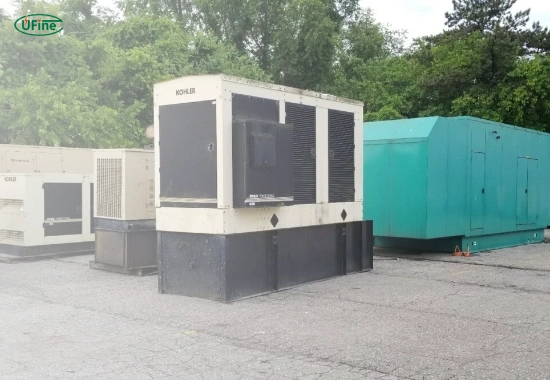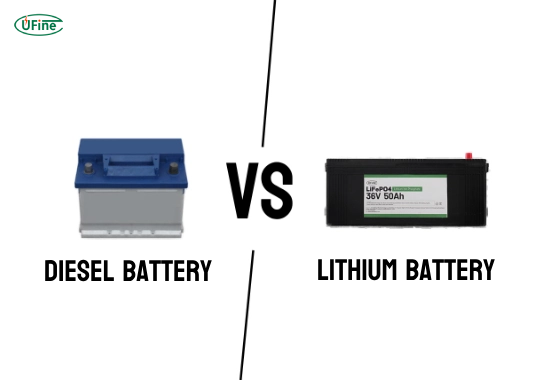
- Part 1. What is a diesel battery backup system?
- Part 2. What is a lithium battery backup system?
- Part 3. Diesel batteries vs. lithium batteries: Which lasts longer?
- Part 4. Diesel batteries vs. lithium batteries: Which provides more power?
- Part 5. Diesel batteries vs. lithium batteries: Which is easier to install?
- Part 6. Diesel batteries vs. lithium batteries: Which is more eco-friendly?
- Part 7. Diesel batteries vs. lithium batteries: Which is more cost-effective?
- Part 8. Diesel batteries vs. lithium batteries: Which is safer?
- Part 9. Diesel batteries vs. lithium batteries: Which is better for off-grid living?
- Part 10. Diesel batteries vs. lithium batteries: Which suits your needs?
- Part 11. FAQs about diesel batteries vs. lithium batteries
Looking for the best battery for your backup generator? Here’s a detailed comparison of diesel and lithium batteries, outlining their pros and cons to help you decide for your energy needs.
Part 1. What is a diesel battery backup system?
A diesel battery backup system is designed for power reliability in critical environments. It combines a diesel-powered generator with a battery storage unit, usually lead-acid or AGM batteries. The system runs the diesel generator to charge the batteries, supplying power when the generator is off or during peak loads.
Key characteristics of diesel battery systems:
- Fuel-based operation: Requires regular diesel fuel supply.
- High power output: Suitable for industrial use.
- Moderate to long runtime: Can operate for hours or days with sufficient fuel.
- Heavy-duty applications: Widely used in hospitals, manufacturing plants, and data centers.
Diesel batteries are praised for their ruggedness and ability to deliver instant high power, but they have drawbacks, such as maintenance needs, fuel dependency, and environmental concerns.
Part 2. What is a lithium battery backup system?
A lithium battery backup system is a modern energy storage solution that uses lithium-ion technology to store electricity. These systems usually pair with solar panels, grid-tied systems, or inverters and are popular in residential and commercial setups.
Key benefits of lithium battery systems:
- Rechargeable and efficient: Offers fast charging and high depth of discharge (DoD).
- Low maintenance: No fuel, no fumes, and minimal upkeep.
- Clean energy compatibility: Works great with solar and wind systems.
- Compact and lightweight: Easier to install and scale.
When comparing diesel and lithium batteries, lithium is the go-to for homeowners or businesses looking for renewable, silent, and compact backup energy.
Part 3. Diesel batteries vs. lithium batteries: Which lasts longer?
Battery life is a crucial factor when investing in a backup system.
Diesel batteries:
- Typically last around 1,000–1,500 cycles or 5–10 years.
- Lifespan depends heavily on usage, maintenance, and operating temperature.
- Frequent cycling and poor maintenance can reduce lifespan.
Lithium batteries:
- Offer up to 5,000–7,000 cycles, with a life expectancy of 10–15 years.
- Maintain performance even after thousands of cycles.
- Include smart battery management systems (BMS) for protection and monitoring.
✅ Winner: Lithium batteries last longer, making them a better long-term investment.
Part 4. Diesel batteries vs. lithium batteries: Which provides more power?
Power output is key when you need to run heavy appliances or machines.
Diesel batteries:
- Provide high surge power—ideal for running industrial equipment or entire buildings.
- Can start large motors and maintain power during peak loads.
- Performance is not affected by ambient temperature as much as lithium.
Lithium batteries:
- Provide consistent output, but may struggle with very high startup loads.
- Limited by inverter capacity and battery discharge rate.
- Best suited for steady, long-term loads like home appliances, lighting, or electronics.
✅ Winner: For immediate high power, diesel batteries are better. Lithium takes the lead in steady, efficient power.
Part 5. Diesel batteries vs. lithium batteries: Which is easier to install?
Ease of installation is important for homeowners and small businesses.
Diesel battery systems:
- A fuel tank, ventilation, and compliance with local codes are required.
- Installation is complex and often requires licensed professionals.
- Additional systems like exhaust pipes, vibration pads, and soundproofing may be needed.
Lithium battery systems:
- Modular design makes them plug-and-play.
- Can be wall-mounted or stacked vertically.
- No fuel, exhaust, or moving parts—ideal for indoor installation.
✅ Winner: Lithium batteries are easier and faster to install, especially in residential or small commercial settings.
Part 6. Diesel batteries vs. lithium batteries: Which is more eco-friendly?
Environmental impact is a significant concern today.
Diesel batteries:
- Burn fossil fuels, releasing CO₂, NOx, and PM2.5 pollutants.
- Produce noise and vibration.
- Require regular oil changes and fuel management.
Lithium batteries:
- Emission-free during operation.
- Can be powered with solar or wind energy for a zero carbon footprint.
- Recyclable components, though the mining of lithium has some environmental concerns.
✅ Winner: Lithium batteries are a greener and cleaner option for backup power systems.
Part 7. Diesel batteries vs. lithium batteries: Which is more cost-effective?
Cost is a significant factor for most buyers.
Diesel batteries:
- Lower upfront cost.
- It requires ongoing fuel, oil, filters, and regular servicing expenses.
- Fuel price fluctuations can impact the operating budget.
Lithium batteries:
- Higher upfront cost, but lower lifetime cost.
- Minimal maintenance, no fuel, and longer lifespan.
- Better return on investment (ROI) over 10–15 years.
✅ Winner: Lithium batteries are more cost-effective in the long run, especially when paired with renewable energy sources.
Part 8. Diesel batteries vs. lithium batteries: Which is safer?
Safety should never be overlooked in power systems.
Diesel batteries:
- Use flammable fuel, risk of leaks, fires, or explosions if not properly maintained.
- Must be installed with fire suppression, spill containment, and ventilation.
- Noise and exhaust pose health risks indoors.
Lithium batteries:
- It comes with advanced safety features like automatic shutoff, thermal management, and overcharge protection.
- Safer for indoor use, especially in homes or offices.
- Minimal risk of fire when properly installed and monitored.
✅ Winner: Lithium batteries are more user-friendly and safer, especially for residential applications.
Part 9. Diesel batteries vs. lithium batteries: Which is better for off-grid living?
Living off-grid requires reliable and efficient energy storage.
Diesel batteries:
- Provide constant power as long as there’s fuel.
- Useful in remote areas without sun or wind.
- Fuel availability can be a challenge.
Lithium batteries:
- Excellent for solar-powered off-grid systems.
- Store excess solar energy for night use.
- Require careful sizing to match energy needs.
✅ Winner: For renewable off-grid setups, lithium batteries are ideal. Diesel can be a backup in emergencies.
Part 10. Diesel batteries vs. lithium batteries: Which suits your needs?
Choosing between diesel batteries and lithium batteries depends on:
| Criteria | Diesel Battery | Lithium Battery |
|---|---|---|
| Power Output | High surge power | Steady output |
| Lifespan | 5–10 years | 10–15 years |
| Maintenance | High | Very Low |
| Fuel Required | Yes | No |
| Installation | Complex | Easy |
| Eco-Friendliness | Low | High |
| Upfront Cost | Low | Higher |
| Long-Term Cost | Higher | Lower |
| Noise & Emissions | Yes | No |
✅ Best for Industrial Use: Diesel batteries
✅ Best for Home and Solar: Lithium batteries
Part 11. FAQs about diesel batteries vs. lithium batteries
Are diesel batteries still relevant with modern technology?
Yes, diesel batteries are still essential in emergency and heavy-duty environments. They provide instant power and are reliable when solar or grid power fails.
Can I use both lithium and diesel together?
Yes! A hybrid system can combine a diesel generator backup with a lithium battery bank for optimized performance and fuel efficiency.
Which battery type is better for urban homes?
Lithium batteries are better for urban homes due to their quiet operation, compact size, and clean energy compatibility.
Can lithium batteries replace diesel batteries completely?
In many cases, yes. When supported by solar panels or the grid, lithium batteries can handle all energy needs in residential and light commercial settings.
Do lithium batteries work in extreme weather?
Modern lithium batteries have thermal regulation systems that allow them to perform well in extreme hot or cold climates.
Related Tags:
More Articles

NiMH vs Lithium 7.2V Battery and Charger: Which Is Better?
Compare 7.2V NiMH vs Lithium batteries and chargers in 2025. Learn runtime, weight, charging, lifespan, and cost to choose the best for your device.
How to Choose the Right 7.2V Battery and Charger for Your Device?
Learn how to choose the right 7.2V battery and charger for optimal performance, safety, and longevity across RC, tools, medical, and industrial devices.
Big Square Battery Safety Standards You Must Know
Learn key safety standards for big square batteries to avoid fire risks, shipping delays, and compliance issues in EV, industrial, and energy storage projects.
Big Square Battery Applications in Solar & Industrial Equipment
Big square batteries deliver high capacity, stable output, and long life for solar, industrial, and backup power. Explore key uses and advantages.
Big Square Battery vs Cylindrical Battery: Complete 2025 Guide for EVs, ESS & Industrial Devices
Choosing the right battery is key for designers and engineers. Compare big square vs cylindrical batteries to find the best fit for your application.




